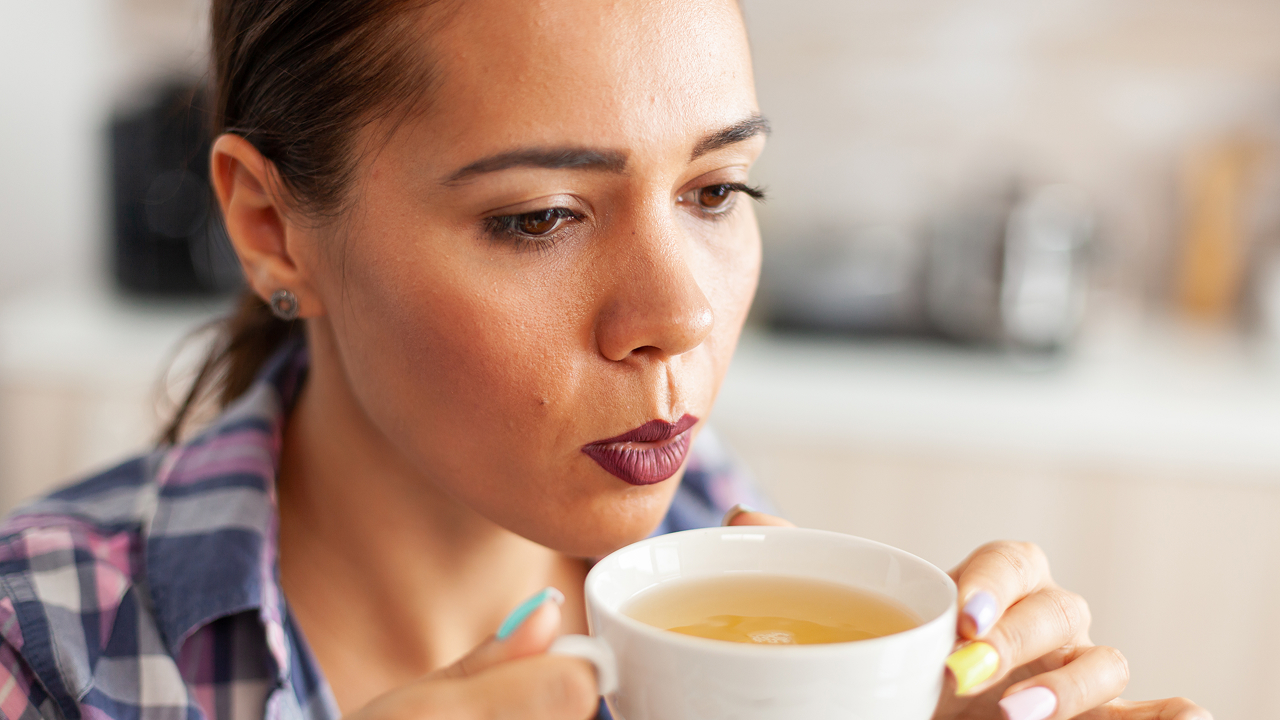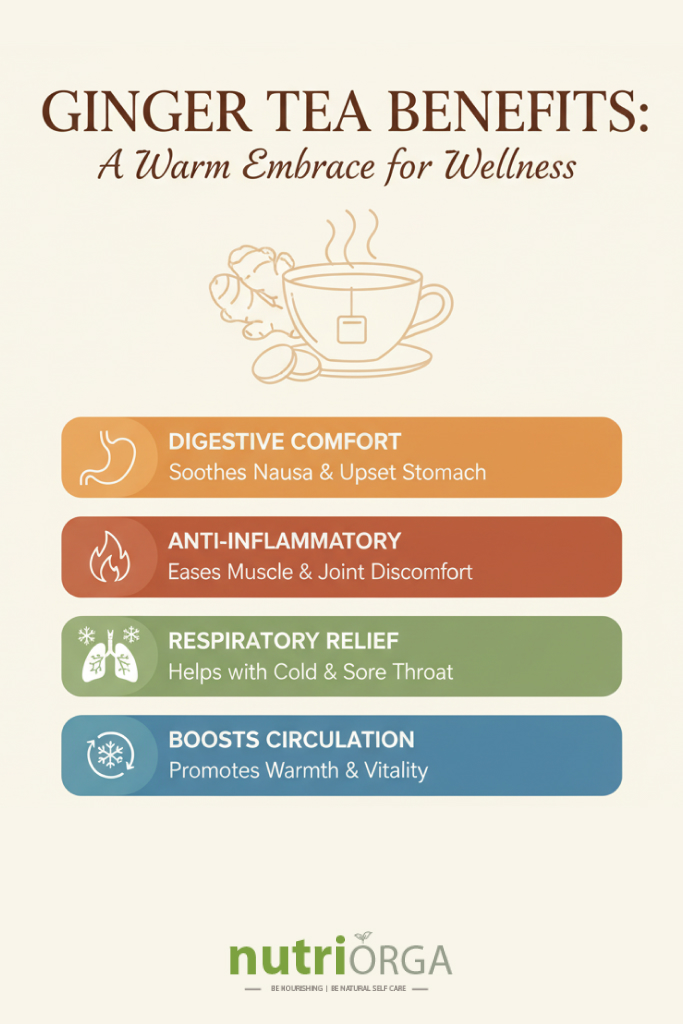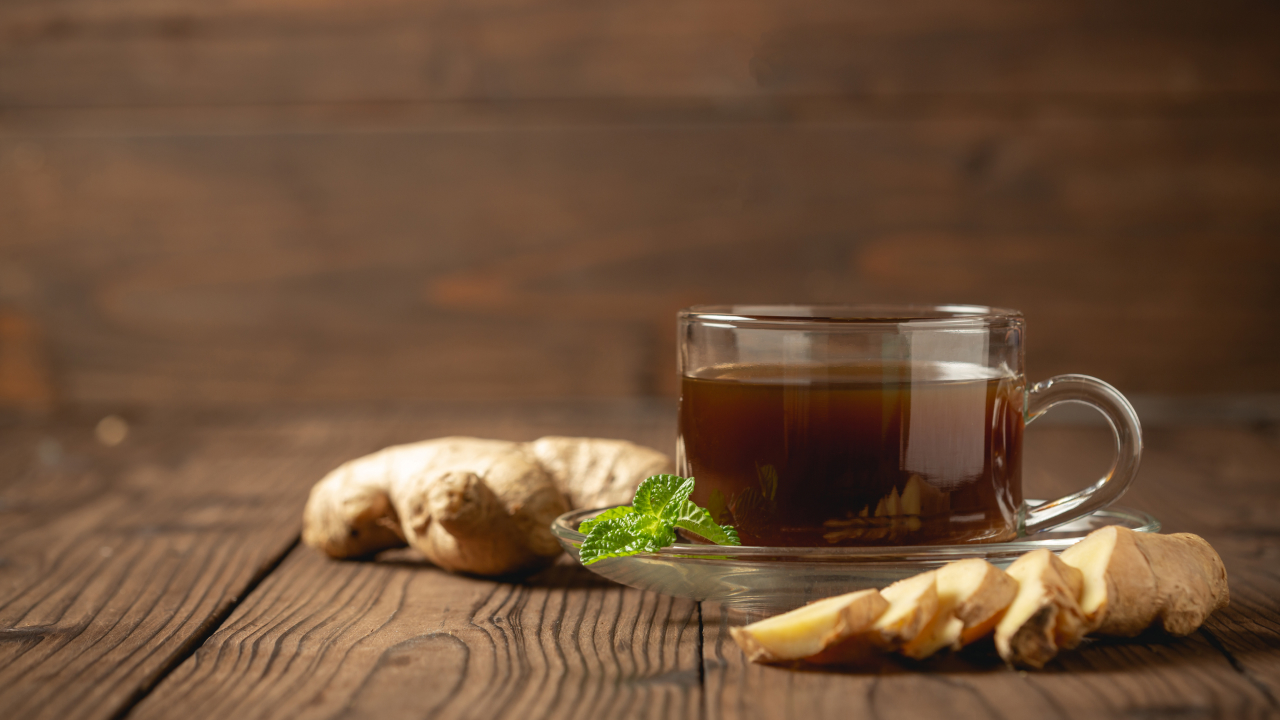Ginger (Zingiber officinale) is one of the oldest, most essential herbal medicines and a seasoning available in Asia. With its lively, strong fragrance and bean, it has a wide range of uses. When it comes to wellness, ginger tea benefits have made this drink earn a prime position in cooking, folk medicine, and finest herbal teas for thousands of years.
Ginger tea is the infusion of hot water and freshly peeled ginger root (or powdered ginger) with optional flavors like sugar or lemon zest. It was actually Chinese tea merchants who first tried making it with lemon.
Yet beyond drink, there are many claims, backed by evidence and tradition. Our article will clarify exactly what ginger tea can do, how it works, what findings show, and when it’s safe for you.
Ginger – Key Bioactive Compounds
Let’s explore which compounds are responsible for its medicinal properties to better understand the effects of ginger tea. Some of the main bioactive chemicals are:
- Gingerol – Especially the 6-gingerol in fresh ginger, is responsible for a spicy flavor; it’s also an extremely effective antioxidant/ anti-inflammatory agent.
- Shogaols – Form when ginger is dried or roasted (for some inflammatory effects). They can sometimes be more potent than gingerols in some effects.
- Paradols, zingerone – Other phenolic compounds, each with diverse effects.
- Trace amounts of vitamins and minerals – Vitamin C, various B vitamins, magnesium, potassium, etc., but most of them are not in high doses in teas unless you regularly consume them.
These compounds have an effect in varying ways: decreasing free radical formation, decreasing inflammatory signalling, changing digestive enzyme ion activity, etc.
What Health Benefits of Ginger Tea Are Proven?

The existing scientific literature supports that consuming ginger tea (or ginger) is certainly good for health. Most studies of ginger use it as a supplement/extract or more concentrate formats; however, ginger (including tea and culinary uses) is in archival records, and is becoming a more common research topic.
Here are the main benefits of ginger tea:
Aid in Nausea and Vomiting
Ginger has been in use as a traditional remedy for nausea for many millennia. Studies show that ginger tea or ginger root can decrease the severity of:
- Pregnancy-related morning sickness. Multiple randomized studies show that consumption of ginger, around 1-1.5 grams daily, can help limit the experience of nausea.
- Motion sickness, sea-sickness, nausea from travel on planes, etc. Ginger appears to affect gastrointestinal motility (emptying of the stomach) and is likely stimulating both a receptor response in the gut and brain.
- Postoperatively, chemotherapy nausea (though proof lacks). Some trials show benefit when ginger is added to dietary regimens.
Indigestion, Bloating, and Digestive Health
There are various ways that ginger tea benefits the digestive system:
- Accelerating gastric emptying, which helps with post-meal bloating, discomfort, and feelings of fullness by quickening the pace at which food exits your stomach.
- Reduction of cramps, gas, and flatulence; alleviation of gastrointestinal distress.
- Assistance for those suffering from digestive discomfort or irritable bowel syndrome (IBS), yet further trial data is crucial.
Pain Reduction and Anti-Inflammation
Compounds in ginger suppress inflammatory indicators. For instance, pro-inflammatory cytokine production is lessen by gingerol and shogaol. Among the particular areas are:
- Dysmenorrhea, or pain during menstruation: Ginger has been shown in numerous studies to lessen the severity of cramps and, in certain cases, performs comparably to over-the-counter painkillers.
- Muscle soreness: After people have exercised, some studies say that ginger supplementation can reduce delayed onset muscle soreness (DOMS).
- Osteoarthritis: As an anti-inflammatory, ginger has been shown in some trials to cut joint pain and improve joint flexibility.
Metabolic Health Support, Blood Sugar, Weight
Less in this area than for nausea, but with encouraging results of herbal ginger tea use:
- Some studies have demonstrated that ginger can help to reduce fasting blood glucose levels and HbA1c in people with type 2 diabetes.
- Ginger may help with your lipid profile: in a few experiments, it has reduced LDL cholesterol or triglycerides. Anti-oxidant/anti-inflammatory effects, of course, played a role.
- It may even support bodyweight control through thermogenesis (boosting heat production), appetite suppression, and fat breakdown. Nevertheless, the results are small-scale and in the context of a dietary/lifestyle context.
Immune Support, Colds & Respiratory Effects
Traditionally, ginger has been in use for colds, sore throats, and coughs–with some scientific basis for it:
- Ginger has antioxidant, antimicrobial, and even antiviral components. Ginger tea can be used to alleviate a sore throat and treat upper respiratory tract infections.
- As a result of its anti-inflammatory properties, ginger helps to adjust immune response and ease oxidative stress. This is good both for immunity and health in general.
Antioxidant Effects, Anti-Cancer Potential
Although much of the cancer-related work is preclinical (cell cultures or animal models), there have been some promising successes:
- Through its gingerols, shogaols, and paradols, ginger provides the potential to induce cancer cell apoptosis (cell death), inhibit proliferation, and reduce pathways of inflammation and oxidative stress linked to cancer.
- The evidence from human subjects is lacking; tea alone cannot have a noticeable effect, but tea in combination with a diet rich in plant-based foods will add to cumulative antioxidant defense.
How to Make and Use Ginger Tea?

The way you make ginger tea can affect taste as well as its effects. Here’s how to do it well:
Preparation Tips
- Fresh ginger root: peel and slice thinly, or grate. The more gingerols it contains when they hot or dry, the more it turns gingerol into shogaol, which changes potency and flavor.
- Quantity: one to two grams of fresh ginger root (≈ a thumb-size slice) put into a cup. Stronger teas use more. Certain clinical effects (like relief from nausea) require higher doses, but with caution.
- Heat & time: simmer 10-15 minutes to extract more active compounds. For a lighter flavor, steep less.
- Additives: Lemon, honey, cinnamon, or mint give added flavor, and in honey (for example), antimicrobial effects are good. But they also introduce sugars/calories.
The Easiest Way of Making Ginger Tea
Most working individuals are busy in daily grinds, leading them to feel exhaustion and less energy. They have no or little time and energy to invest in making tea. Working people can use NutriOrga’s Herbal Ginger Tea Bags for optimum effects with no hassle at all.
- Pour hot water, add our Herbal Ginger Tea Bag, Steep as needed, Enjoy!
Additives listed above are optional.
The Dosage and Frequency
Frequency of taking the tea and condition-specific dosage information is as follows,
- Consuming 1 to 3 cups of tea a day is common in observational or small clinical studies.
- For therapeutic effects like pregnancy, nausea, or menstrual pain, different protocols exist. Clinical studies may have fixed doses such as 1-2 grams of ginger for set durations.
- Always check reliable sources or use medical advice when using ginger for health conditions.
Possible Risks of Ginger Tea

While ginger is generally safe for most people when consumed in food (and moderate tea use), there are some precautions and potential risks to consider:
- Digestive discomfort: High doses may cause heartburn, gas or bloating, diarrhea, or stomach irritation in sensitive individuals.
- Bleeding risk/interactions: Ginger has a mild antiplatelet/anticoagulant effect, which might increase bleeding risk if combined with blood thinners (like warfarin, aspirin), or in people who have clotting disorders.
- Pregnancy: Although several studies show the benefit of ginger for morning sickness in early pregnancy, caution is advisable with very high intake, and pregnant individuals should consult healthcare providers.
- Medication interactions: There is a potential for interaction with diabetes medications (because ginger may lower blood sugar), blood pressure drugs, etc. Monitoring is advised.
- Allergies and hypersensitivity: Rarely, some people may have allergic reactions or experience irritation of the mouth or throat.
Traditional & Cultural Uses
Ginger tea has been used in many traditional systems of medicine. Traditional Chinese Medicine (TCM) prescribes ginger for colic and digestive upset, and it is a warming herb. Ayurveda uses ginger (or “adrak“) to aid digestion, reduce “ama” (toxins), improve circulation, relieve nausea, etc.
Ginger tea is a “home remedy” for colds, sore throats, joint pains, and digestive ills in many cultures. Such traditional uses often coincide with modern observations, especially concerning nausea, digestion, and anti-inflammatory effects.
Limitations and What Science Has Not (Yet) Proven
There are things ginger tea might do, and things it has not yet been proven to do:
Strong prevention or treatment of serious chronic disease (like cancer or Alzheimer’s) has not been established. Most human studies are small, short-term, or observational.
While ginger may play a modest role, it is not a panacea for dieting. Effects are weak and depend mainly on overall caloric balance, diet, and activity. Individual responses vary widely depending on genetics, health status, preparation method, and dosage.
Putting It All Together – Practical Advice
Here are suggestions for using ginger tea in everyday life, based on current knowledge, for typical healthy adults:
- To settle nausea or an upset stomach: 1–2 grams of ginger daily (as tea or food) can be helpful. For pregnancy-related nausea, low-to-moderate ginger intake may ease symptoms; consult a healthcare professional first.
- For digestion and bloating: drinking ginger tea about 20–30 minutes after dinner can ease discomfort.
- For menstrual cramps: begin two days before the expected pain and continue through the first part of the cycle for potential relief.
- For general health: 1 cup per day can be part of a diet rich in fruits, vegetables, and whole foods. Fresh ginger in cooking or teas provides additional beneficial compounds.
Conclusion
Ginger tea is more than just a warm drink – it has several modest but meaningful health effects. However, it is not a cure-all. Benefits of ginger tea are generally modest, and ginger tea should be used as a supportive remedy – not as a replacement for medical treatment. Preparation method, dose, and individual health factors all influence its effects.
For centuries, ginger tea having numerous benefits has been used safely in many cultures. Modern science supports many of these traditional uses, particularly for nausea, digestive health, and inflammation. For most people, ginger tea is an inexpensive, safe, and enjoyable way to support overall wellness.



